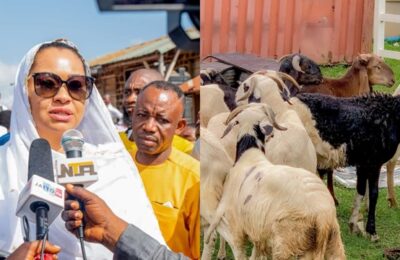By Abdul Aji and Samuel Ilani.
The Igala Festival tagged Igala Unity Hunting Festival also known as Ocho, which was last held in November 1954 during the reign of Ata, Ameh Oboni, was held on Saturday, May 19, 2018. The Chairman of the Central Planning Committee of the festival, Senator Ahmadu Ali, who was met at Ogo-Efa, the Ata’s hunting expedition forest by The Graphic reporters, said the return of Ocho, one of Igala Traditional Festivals, is a welcome development.
Senator Ahmadu Ali said the Ocho is an epoch-making festival as it had not been witnessed by many who had longed to see it. He said, this is the beginning of an era in which the Igala nation has come together as one big family known for hard work, peace and determination. Ocho is a festival that shows the Igalas of old as great hunters. To mark it the Ata shot at a live antelope tied to a tree at a designated spot. If he shot on target, the Ocho had won or succeeded, but if he missed it, it meant the Ocho had failed and it spelled bad omen for the land.
The Omachi Ata Igala, Professor Steven Ikani Ocheni, who is also the Minister of State for Labour and Employment, was the Chairman of the Unity Hunting Festival.
At Ogo-Efa forest The Graphic met Joseph Abu, JP, a well-known “Alo” singer, entertaining chiefs and guests in the forest. His messages were centered on historical antecedents of previous Atas as well as folktales relating to the powers and influences. The forest was full of chiefs, guests from within and outside the country as well as young men and women who were there to witness the Ocho festival starting from the forest.
The Ata had gone on hunting expedition and everybody was waiting for his return, including the Iye Oja, the Ata’s wife; the Iye Gbagamaye – symbolized by a young virgin lady carrying a load rapped in red cloth and Ata’s priest symbolized by a young boy painted white with face covered with red cloth and carrying a mock idol. The Ata’s drummers were on ground beating the traditional rhythm, while the Ata’s abode in the forest was guided by Barrister, Chief James Ogwu Onoja, SAN, the Agenyi Ata of Igala, who was dressed in hunting costume, with a magnificent arrows and bow, as the Ata was away on hunting expedition.
Suddenly the Ata appeared from an opposite direction and shot his arrow at the symbol of an animal he has killed from the forest, after which he made triumphant entry into his supposed “house” through the backside. And that was the climax of the Ogo-Efa episode of the festival.
Ata came out of his” house” later in full kingship regalia, entered his waiting vehicle and everybody accompanied him to Erane, in Idah town. There the Ata was met by all his masquerades. The Ata Igala who is the chief custodian of the Igala custom and tradition has nine royal masquerades namely; Ekwe, Agbanabo, Ikelekwu-Afuma, Epe, Ichaula, Ochochono,Inelekpe, Odomado ,Elenwuche. The head of these and all the masquerades in Igala land is the Ekwe Ayegba masquerade.
From Erane down to the Ata’s palace, dancers and chiefs were on two sides of the road to welcome the Ata home, even as some engaged themselves in beer parlours. The Ata moved in slow convoy from Erane to his palace where he broke the cola nut and made appeals to the Almighty God to bless the Igala land and the people. He said armed bandits and their likes shall never entre Igala land. The Ata also made a royal speech. He said Igala is a formidable ethnic group in Nigeria and a force to reckon with for the development of the nation. He said the land shall continue to witness peace and development and who ever brings calamity to the land shall be consumed in his calamity.
All the traditional rulers in Igala land who were present paid homage to the Ata, one after the other. The Ata’s masquerades made cultural displays before the Ata according to their seniority and status. The Ata then unbanned Achadu’s masquerade, Oche Dugbe, which was banned many years ago from entering Ata’s palace. It was rumoured that Oche Dugbe was too arrogant and life-threatening to followers and spectators and had to be banned.
The chairman of the occasion, Senator Ahmodu Ali, thanked the people for coming out massively to witness the festival. He said history has been made during the reign of His Royal Majesty, Chief Michael Idakwo Ameh Oboni II, as Ocho which was banned by colonial administrators was brought back during his time.
The Occasion was witnessed by many prominent sons and daughters of Igala land. All traditional rulers from the nine local governments in the state were present. The Igala people in Anambra State were present in their numbers.
The Ocho and other four festivals were banned by the colonial administrators in 1954, as a result of petitions and allegations of human sacrifice by some acclaimed Christian Igala men, whose names cannot be mentioned here.
It was all efforts at bringing down the reign of Ata Ameh Oboni, who was seen as one of the most prominent Ata to have reigned in Igala Kingdom. Ata Ameh Oboni had to commit suicide as forces against him thickened.
The tragedy of Ata Ameh Oboni was quite similar to those of great kings like Ovonramwen Nogbaisi, King Jaja of Opobo, Nana of Itsekiri and other who were forced to abdicate their thrones by the adventurous Europeans. The explorers or missionaries resorted to all manners of trickery; subterfuge; divide and rule, blackmail, and other subterranean devices in order to realize their ambitions abound and Ameh Oboni’s story is another gift to that exercise. Prior to the coming of the whites to Igala land, the territory knew peace. The people’s custom and traditions were sacrosanct, the political institutions were revered, commercial activities went on smoothly, and the people lived in harmony
Deploying the indirect rule system, Muffet saw in the Ameh Oboni, a threat to the total takeover of the land. As a result, he raised all manners of accusations. For example Muffet tagged the Ameh Oboni as an unrepentant pagan, a ritual killer and idol worshipper. He even went as petty as seeing him as a threat to the animal kingdom because as the custodian of the people’s tradition, he has to shoot an animal dead during the famous Ocho festival.
Apparently, those were the usual excuses deployed by the colonialists to get rid of powerful monarchs. The British interest in Igalaland at that time was total control of the administration and economic interests of the land as they have done in the northern parts. The false accusations, however, prepared grounds for the conflict between Ata and the British administration.
The white man relying on his military might, therefore, directed the Ata to leave Idah for Ochaja, a decision which had great spiritual and political implications. Perhaps to forestall an armed conflict between the natives and the British, a peace meeting was arranged in Kaduna. Expectedly, all the spurious allegations levied against the Ameh Oboni by Muffet were debunked as a result of which the governor asked the Ata to return to Idah. But the over-bearing and over-ambitious Muffet, backed by some disloyal chiefs and Christian elites insisted that Ata must remain in exile at Ochaja. Amid this confusion and frustration, rather than capitulate to the British authorities, Ata Ameh Oboni contemplated suicide.
The present Ata of Igala, His Royal Majesty, Chief Idakwo Michael Ameh Oboni, was about five years old when the last Ocho festival was held in November 1954.











